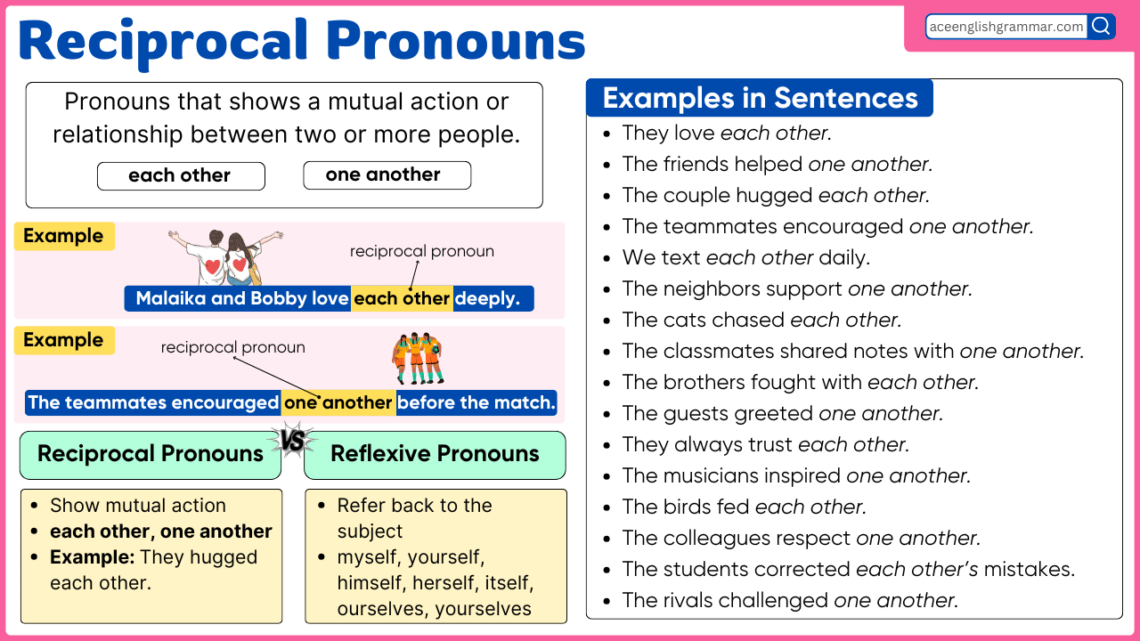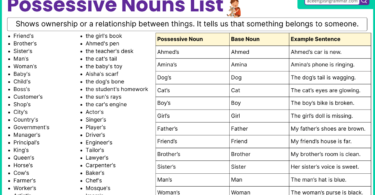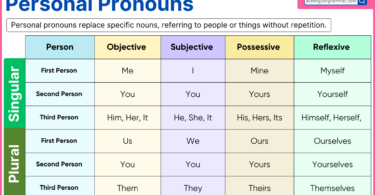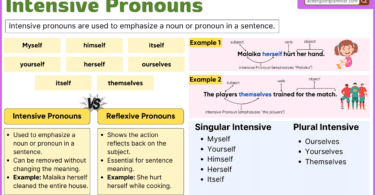Reciprocal pronoun show a mutual relationship between two or more people or things. Words like each other and one another help express shared actions or feelings in sentences. Many learners struggle with their correct usage, leading to grammar mistakes. This blog post helps learn reciprocal pronouns with definitions, rules, and examples to enhance your English grammar.
A reciprocal pronoun is a pronoun that shows a mutual action or relationship between two or more people.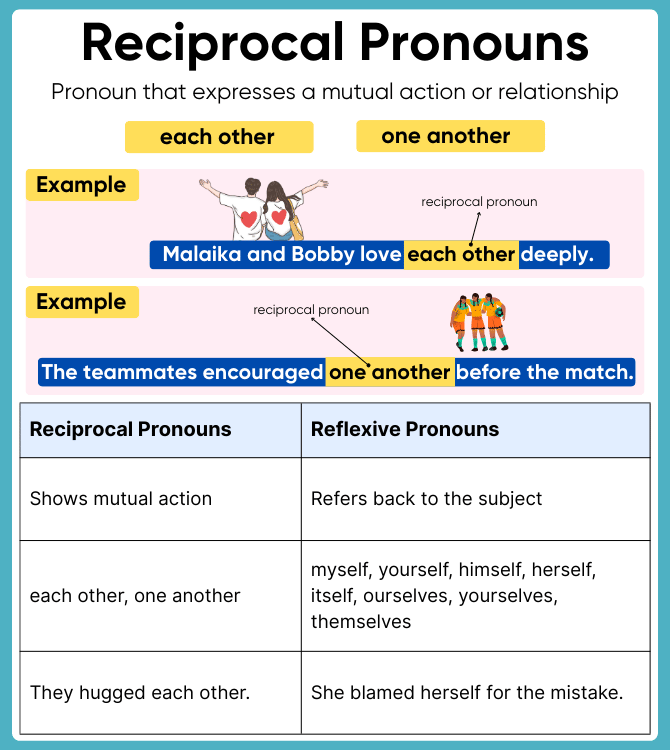
Table of Contents
Definition of Reciprocal Pronoun
A reciprocal pronoun is a pronoun that expresses a mutual action or relationship between two or more people. It indicates that individuals are performing an action toward one another.
- Aisha and Bilal always support each other.
- The teammates encouraged one another before the game.
Two Reciprocal Pronouns
In English, there are only two reciprocal pronouns: each other and one another.
- Each other
- One another
Difference Between “Each Other” and “One Another”
Traditionally, each other and one another had distinct uses:
- Each other
Used when referring to two people.
✅ Ali and Aisha trust each other.
- One another
Used when referring to more than two people.
✅ The teammates support one another.
How to Use Reciprocal Pronouns in Sentences
Reciprocal pronoun function as objects in a sentence, usually following a verb or preposition. They indicate that an action is mutually shared between the subjects.
- Aisha and Zain respect each other.
- The students in the class help one another with homework.
- The two teams played against each other in the final match.
- The neighbors always greet one another warmly.
Real-Life Examples of Reciprocal Pronouns
Reciprocal pronouns are commonly used in everyday conversations and writing to indicate shared actions or feelings.
- Sarah and Ahmed love each other deeply.
- The soccer players congratulated one another after the match.
- Friends should always support each other in tough times.
- The committee members disagreed with one another on the decision.
- Ahmed and Aisha always support each other.
- The students in the class help one another with assignments.
- The two brothers often borrow clothes from each other.
- The teammates encouraged one another before the match.
- Sarah and Bilal called each other to discuss the project.
- The neighbors look out for one another during emergencies.
- The couple surprised each other with gifts.
- The colleagues share ideas and learn from one another.
- The cats were playfully chasing each other around the house.
- The competitors congratulated one another after the race.
- Hamza and his best friend trust each other completely.
- The children in the park were pushing one another on the swings.
- The business partners respect each other’s opinions.
- The classmates exchanged notes to help one another before exams.
- The birds were feeding each other in the nest.
- The couple whispered sweet words to each other during dinner.
- The soldiers protected one another on the battlefield.
- The siblings always stand up for each other.
- The players on the basketball team motivate one another.
- The tourists took photos of each other at the landmark.
Reciprocal Pronouns vs. Reflexive Pronouns
Reciprocal pronouns are often confused with reflexive pronouns. However, their functions are different.
Reciprocal pronouns indicate a mutual action between multiple people, while reflexive pronouns refer back to the subject of the sentence.
| Feature | Reciprocal Pronouns | Reflexive Pronouns |
|---|---|---|
| Meaning | Shows mutual action | Refers back to the subject |
| Pronouns Used | each other, one another | myself, yourself, himself, herself, itself, ourselves, yourselves, themselves |
| Example | They hugged each other. | She blamed herself for the mistake. |
Common Mistakes with Reciprocal Pronouns
- They were talking to themselves. ❌
- They were talking to each other. ✅
- The students shared their books with themselves. ❌
- The students shared their books with one another. ✅
- They gave the gift to themselves. ❌
- They gave the gift to each other. ✅
- The children helped themselves with the homework. ❌
- The children helped each other with the homework. ✅
- The teachers spoke to themselves during the meeting. ❌
- The teachers spoke to each other during the meeting. ✅
- He and his brother were arguing with themselves. ❌
- He and his brother were arguing with each other. ✅
- The neighbors were always borrowing from themselves. ❌
- The neighbors were always borrowing from each other. ✅
Reciprocal Pronouns Example Sentences
Using Each Other
- Hassan and Mariam call each other every day.
- The two countries signed a peace treaty to support each other.
- The siblings always tease each other playfully.
- The two birds chased each other in the sky.
Using One Another
- The teachers shared teaching strategies with one another.
- At the meeting, the executives discussed ideas with one another.
- The fans cheered for one another at the concert.
- Different cultures influence one another over time.
Reciprocal Pronouns Exercises
Fill in the blanks with “each other” or “one another”:
- The two best friends always support __________.
- The scientists exchanged research findings with __________.
- The couple bought gifts for __________ on their anniversary.
- The members of the debate team encouraged __________ before the competition.
- The opposing teams showed respect for __________ after the game.
Answers:
- each other
- one another
- each other
- one another
- one another
Why Reciprocal Pronouns Are Important
Reciprocal pronouns enhance clarity in communication by indicating mutual relationships or actions. They prevent repetition and make sentences more concise and natural. Understanding and using them correctly is essential for effective English writing and speaking.
FAQs
A reciprocal pronoun is a special type of pronoun used to indicate shared actions between two or more people. English has two reciprocal pronouns: ‘each other’ (used for two) and ‘one another’ (used for more than two).
Traditionally, “each other” is used for two entities, while “one another” is used for more than two. However, in modern English, they are often used interchangeably.
No, reciprocal pronouns always function as objects in a sentence, never as subjects.
Reciprocal pronouns indicate a shared action between multiple subjects, while reflexive pronouns refer back to the subject itself.
Yes, in most cases, they can be used interchangeably, though traditional grammar suggests “each other” for two people and “one another” for more than two.
Conclusion
Reciprocal pronouns play a vital role in expressing mutual actions between individuals or groups. By mastering their usage, you can make your English more natural and fluent. Keep practicing with real-life examples and exercises to reinforce your understanding!
You might also like

